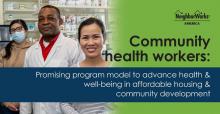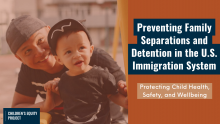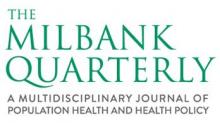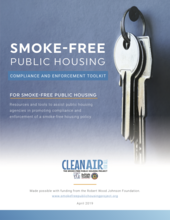Found 181 resources.
0
0
0

A Community Health Worker Program Development & Toolkit for Affordable Housing and Community Development Organizations
Topics: Health, Healthy homes, Housing
 Shared by Camille Anoll-Hunter
on Aug 3, 2023
Shared by Camille Anoll-Hunter
on Aug 3, 2023 0
0
0

We all want to live in a community where everyone has access to safe drinking water, green parks, and a reliable transit system. Strong infrastructure is key to ensuring communities have access to these necessities.
But this is not everyone’s reality today. For decades, barriers like residential segregation have fueled a lack of investment and inadequate and failing infrastructure in places where Black, Latino, and Indigenous people live today. These inequities create barriers to good health.
Investing in infrastructure—the building blocks of our communities—can transform communities so...
Topics: Environmental Resiliency/Climate Change, Green, Health, Racial inequalities, Research, Transportation
 Shared by Sandra Ware
on May 25, 2023
Shared by Sandra Ware
on May 25, 2023 0
0
0

Family separations and family detention have been used as part of immigration enforcement in the United States. These practices and policies are severely detrimental to child health and wellbeing and can cause lasting harm.
This brief reviews the state of the research on the developmental, psychological, and physical toll of family separation and family detention on children and their caregivers. Grounded in this science, we provide a set of policy recommendations that protect child health and wellbeing.
Topics: Child welfare, Early childhood, Health, Immigrants, Legislation & Policy, Mental health, Youth
 Shared by Sandra Ware
on Mar 30, 2023
Shared by Sandra Ware
on Mar 30, 2023 0
0
0

Poor maternal and child health (MCH) outcomes and rates of chronic disease are persistently high in the United States and concentrated in rural and service-deprived areas where local health departments provide most care. In a new Milbank Quarterly study, Taryn A. G. Quinlan, Amelia L. Mitchell, and Glen P. Mays of the Colorado School of Public Health use national survey data from 630 local health departments to understand the relationship between social service collaboration and the provision of direct MCH services, such as the Special Supplemental Nutrition Program for Women, Infants, and...
Topics: dual-generation initiative, Early childhood, Health, Low-income, Partnerships, Research
 Shared by Sandra Ware
on Feb 7, 2023
Shared by Sandra Ware
on Feb 7, 2023 0
0
0

In the newly released Stanford Social Innovation Review article, co-authors Jessica Mulcahy, Success Measures at NeighborWorks America; Vedette R. Gavin, Verge Impact Partners; and Stacey Barbas and Kate McLaughlin, The Kresge Foundation discuss their collaborative work on a three-year developmental evaluation to learn about the strategies and approaches grantees are using to advance health equity through housing. This article is part of the series “Collaboration for Housing Justice” sponsored by Funders for Housing and Opportunity to mark their fifth anniversary.
Topics: Community development, Health, Housing, Place-based, Racial inequalities, Research
 Shared by Camille Anoll-Hunter
on Dec 15, 2022
Shared by Camille Anoll-Hunter
on Dec 15, 2022 0
0
0
Successful diabetes care for vulnerable populations demands a multi-prong approach, deploying direct health interventions, medications, and support from a range of community resources to address the social determinants, which impact diabetes. This brief will highlight, through case studies and program descriptions, the important role of non-clinical staff in both the health center and housing setting to support individuals and families struggling to prevent and keep diabetes conditions under control.
Topics: Health, Housing
 Shared by Sandra Ware
on Nov 29, 2022
Shared by Sandra Ware
on Nov 29, 2022 0
0
0
The series highlights the promising work of the EHS-CCPs to date, particularly related to pandemic recovery and stabilization, workforce support, and expanding access to holistic support for children and families, especially mental health support. The briefs highlight the many roles that states can play in establishing and expanding their own EHS-CCPs, including by using Preschool Development Grant Birth to Five funding and aligning CCDF quality funding with supports needed to establish and grow the Early Head Start model.
The EHS-CCPs take many forms in states and communities across the...
Topics: Child welfare, COVID-19, Health, Mental health, Workforce development
 Shared by Sandra Ware
on Nov 3, 2022
Shared by Sandra Ware
on Nov 3, 2022 0
0
0
NCHPH has catalogued promising practices on health center and housing partnerships that were identified during T/TA activities. Some promising practices in this publication include collaboration strategies to address COVID-19, flu vaccination efforts, smoking cessation, access to health care, and more.
Topics: Health
 Shared by Gabe Castro
on Sep 23, 2022
Shared by Gabe Castro
on Sep 23, 2022 0
0
0
Getting regular exercise can be a challenge, but there are many positive benefits, particularly for
people with diabetes.
Topics: Exercise, Health, Healthy homes, Nutrition
 Shared by Gabe Castro
on Sep 23, 2022
Shared by Gabe Castro
on Sep 23, 2022 0
0
0
The Effects of ‘Food Deserts’ on Public Housing Residents Living with Diabetes
Topics: Energy, Exercise, Health, Healthy homes, Mobility, Nutrition
 Shared by Gabe Castro
on Sep 23, 2022
Shared by Gabe Castro
on Sep 23, 2022 0
0
0
This toolkit by NCHPH and NNCC provides information and resources for health center staff to partner and collaborate more effectively with their local housing authorities and with other providers serving residents of public housing and other low-income housing.
Topics: Health, Partnerships
 Shared by Camille Anoll-Hunter
on Sep 23, 2022
Shared by Camille Anoll-Hunter
on Sep 23, 2022 0
0
0
The National CLAS Standards are intended to advance health equity, improve quality, and help eliminate health care disparities by establishing a blueprint for health and health care organizations
Topics: Communications, Health, Immigrants
 Shared by Camille Anoll-Hunter
on Aug 26, 2021
Shared by Camille Anoll-Hunter
on Aug 26, 2021 0
0
0
A Playbook for Local Health Department Strategies in the United States
Topics: COVID-19, Health
 Shared by Camille Anoll-Hunter
on Aug 26, 2021
Shared by Camille Anoll-Hunter
on Aug 26, 2021 0
0
0
In March 2020, the COVID-19 pandemic forced many public housing authorities (PHAs) to quickly adjust their operational procedures to protect their staff while providing emergency assistance to residents. Many PHAs had to close their offices and convert to remote operations almost overnight, while staff focused on supporting their tenants by delivering them food, doing wellness checks for vulnerable residents, and ensuring they had access to and in some cases providing the technology needed for children to attend school remotely and isolated residents to remain connected to friends, family,...
Topics: Advocacy, COVID-19, Data sharing, Health, Housing, Safety, Supportive housing
 Shared by Housing Is
on May 25, 2021
Shared by Housing Is
on May 25, 2021 0
0
0

In California, more than 3.7 million students were eligible for free or reduced priced school meals in the 2017-2018 school year. For many of those students, school meals are the primary source of regular access to healthy food. When the bell rings at 3:00 or lets out for summer break, many of those students go home to nutritional uncertainty or high-calorie, low-nutrient foods.
For many low-income families, the out-of-school-time food access gap increases family stress: limited budgets are stretched further to cover food, rent, utilities, transportation, medications, and chidcare costs....
Topics: Advocacy, Early childhood, Food insecurity, Health, Healthy homes, Housing, Legislation & Policy, Low-income, Nutrition, Out-of-school time, West Coast, Youth
 Shared by Linda Lu
on Dec 4, 2019
Shared by Linda Lu
on Dec 4, 2019 0
0
0

A majority of property managers report that a smoke-free policy is largely well followed and self enforced by residents and staff. However, it is not uncommon for a small minority of residents to struggle or refuse to comply by continuing to smoke or allowing their guests to smoke on the property. These resources and tools can assist management in promoting compliance and enforcing the policy when necessary. If you would like to consult on solutions specific to your situation, reach out to info@smokefreepublichousingproject.org.
Topics: Health, Healthy homes, Smoke-free
 Shared by Jackie Siewert
on Oct 3, 2019
Shared by Jackie Siewert
on Oct 3, 2019 0
0
0
CLPHA developed a general data sharing template that public housing authorities (PHAs) and their health partners can customize to suit their data sharing and collaboration needs. Please feel free to comment to share any uses/modifications your organization made to implement into a partnership.
Topics: Affordable Care Act, CLPHA, Community development, Cost effectiveness, Data sharing, Dental, Depression, Dual-eligibles, Funding, Health, Healthy homes, Legislation & Policy, Low-income, Medicaid / Medicare, Mental health, Metrics, MTW, Nutrition, Obesity, Partnerships, Place-based, Preventative care, Racial inequalities, Research, SAMHSA, Smoke-free, Stability, Substance abuse, Supportive housing, Sustainability, TA
 Shared by Steve Lucas
on Aug 5, 2019
Shared by Steve Lucas
on Aug 5, 2019 0
0
0
The Department of Housing and Urban Development (HUD) has announced its intention to roll back protections for transgender people experiencing homelessness. The newly proposed rule, which is in the early stages of the rulemaking process and has not yet been publicly posted to the Federal Register, would allow homeless shelters to discriminate based on gender identity, putting transgender people in danger of violence and further housing instability. This is part of a long string of attacks the Trump administration has directed toward the transgender community, such as implementing the infamous...
Topics: Health, Homelessness, Housing, Legislation & Policy, Racial inequalities
 Shared by Housing Is
on Jun 13, 2019
Shared by Housing Is
on Jun 13, 2019 0
0
0

A more regional approach to care is needed – one that involves coordinated, person-centered healthcare with robust connections to social services and community resources. An innovative infrastructure to do just that is underway in four communities across New Jersey: Trenton, Camden, Newark, and Paterson. Efforts begun in 2011 under New Jersey’s Medicaid Accountable Care Organization (ACO) Demonstration Project have evolved into four regional collaboratives that integrate, coordinate, and align all the disconnected programs aimed at making communities healthier.
Topics: Data sharing, East Coast, Health, Partnerships
 Shared by Housing Is
on Jun 13, 2019
Shared by Housing Is
on Jun 13, 2019 0
0
0
The articles below are part of a special collection commemorating 25 years of the Health Care System Research Network’s (HCSRN's) rigorous research to improve health outcomes and health systems’ performance by leveraging electronic health data. This new collection highlights, among other things, advances in personalized cancer care, the optimal use of AI in health care, and the evolution of common data models, featuring work from Kaiser Permanente, Intermountain Healthcare and others.
Topics: Data sharing, Health, Partnerships, Research
 Shared by Housing Is
on Jun 13, 2019
Shared by Housing Is
on Jun 13, 2019 0
0
0
Zoning rules dictate more than just how we can use and build on land. They also shape our communities and our lives. Land use laws determine where we can find housing, schools, and parks—and who has access to them.
Topics: Health, Housing, Legislation & Policy, Racial inequalities
 Shared by Housing Is
on Jun 13, 2019
Shared by Housing Is
on Jun 13, 2019 0
0
0

This paper analyzes why SNAP benefits are inadequate, reviews the body of research showing positive effects from more adequate SNAP benefits, and offers key policy solutions to improve benefit adequacy.
Topics: Food insecurity, Health, Legislation & Policy, Low-income, Nutrition, Research
 Shared by Housing Is
on Jun 11, 2019
Shared by Housing Is
on Jun 11, 2019 0
0
0
African-Americans are three times more likely to die from asthma as whites. In Philadelphia and elsewhere, how can outcomes improve with changes to housing quality and pollution control?
Topics: Asthma, Health, Housing, Low-income, Racial inequalities
 Shared by Housing Is
on May 23, 2019
Shared by Housing Is
on May 23, 2019 0
0
0
While homeownership has been linked to positive health outcomes there is limited evidence regarding the conditions under which it may be health protective. We present a conceptual model linking homeownership to health, highlighting key potential pathways. Using the Detroit Metropolitan Area as a case study, and data from the American Community Survey (2009–2013; 5-years estimates) and Michigan Department of Community Health, we tested the following questions: (1) Is neighborhood percentage non-Hispanic Black (NHB) associated with homeownership? (2) Is neighborhood percentage NHB associated...
Topics: Health, Housing, Research
 Shared by Housing Is
on May 23, 2019
Shared by Housing Is
on May 23, 2019 0
0
0
In May 2018, Kaiser Permanente, the largest private integrated care system in the US, announced that it would invest $200 million through its Thriving Communities Fund to address the affordable housing crisis in California’s Bay Area. Then in 2019, Kaiser announced that it used the fund to purchase an apartment building in a diverse but quickly gentrifying neighborhood in Oakland with the express purpose of making repairs and upgrades to improve health in the building and to ensure affordability to current residents. If Kaiser wanted to improve health, why wouldn’t it focus solely on housing...
Topics: Health, Housing, Low-income
 Shared by Housing Is
on May 23, 2019
Shared by Housing Is
on May 23, 2019 
